
Sep 13
/
Laleska Moda
Japanese stocks drop, but consumption nears 22/23 levels
Back to main blog page
- The latest figures from the JCA (Japan Coffee Association) indicate that Japanese stocks fell to 2.4 million bags in July compared to May. On a year-over-year basis, the volume remained stable, although stocks are still below historical averages.
- Apparent demand for the 23/24 season (Oct/23-Jun/24) is also below historical averages but is already approaching 22/23 levels. This also supports our expectation that total demand for the season will be similar to 22/23, at 6.2 million bags.
- Looking at the latest import data from the Asian country, it is also clear that the share of Brazilian grain in the total volume is increasing. Another noteworthy trend is the decline in the share of other producers, such as Vietnam, reflecting limited stocks and production problems.
- In Brazil, August exports reached a new monthly record of 3.7 million bags, up 0.7% from last year. Shipments were mainly driven by conilon, which has been gaining ground on the international market due to limited supply in Southeast Asia.
Japanese stocks drop, but consumption nears 22/23 levels
The latest Japanese stock data released by the JCA shows a decline of 3.3% between May and July, with the volume falling to 2.42 million bags. Although inventories for this period are at the same level as in 22/23, they are still below historical levels of 2.8 million bags.
Although lower stocks are a supportive fundamental for prices, the Asian country's apparent demand has been reduced since 2022, especially between 2022 and 2023. However, apparent consumption for the 23/24 season (Oct/23-Jun/24) has stabilized, with a cumulative volume similar to 22/23, at around 4.7 M bags. Given this scenario, we will maintain our initial forecast of total demand from Japan of around 6.2 M bags, practically stable compared to 22/23.
On the other hand, it is important to monitor the monthly evolution of consumption in the second half of 2024 for the 24/25 estimates, as high coffee prices could still have a negative impact on Japanese and global demand for the commodity. In general, prices continue to be supported by supply-side concerns, particularly in Vietnam. In addition to lower production in 23/24, the 24/25 season has been affected by high temperatures and drought in early 2024 and now by the possibility of excessive rainfall during the 24/25 harvest.
Japanese Stocks – JCA (M bags)
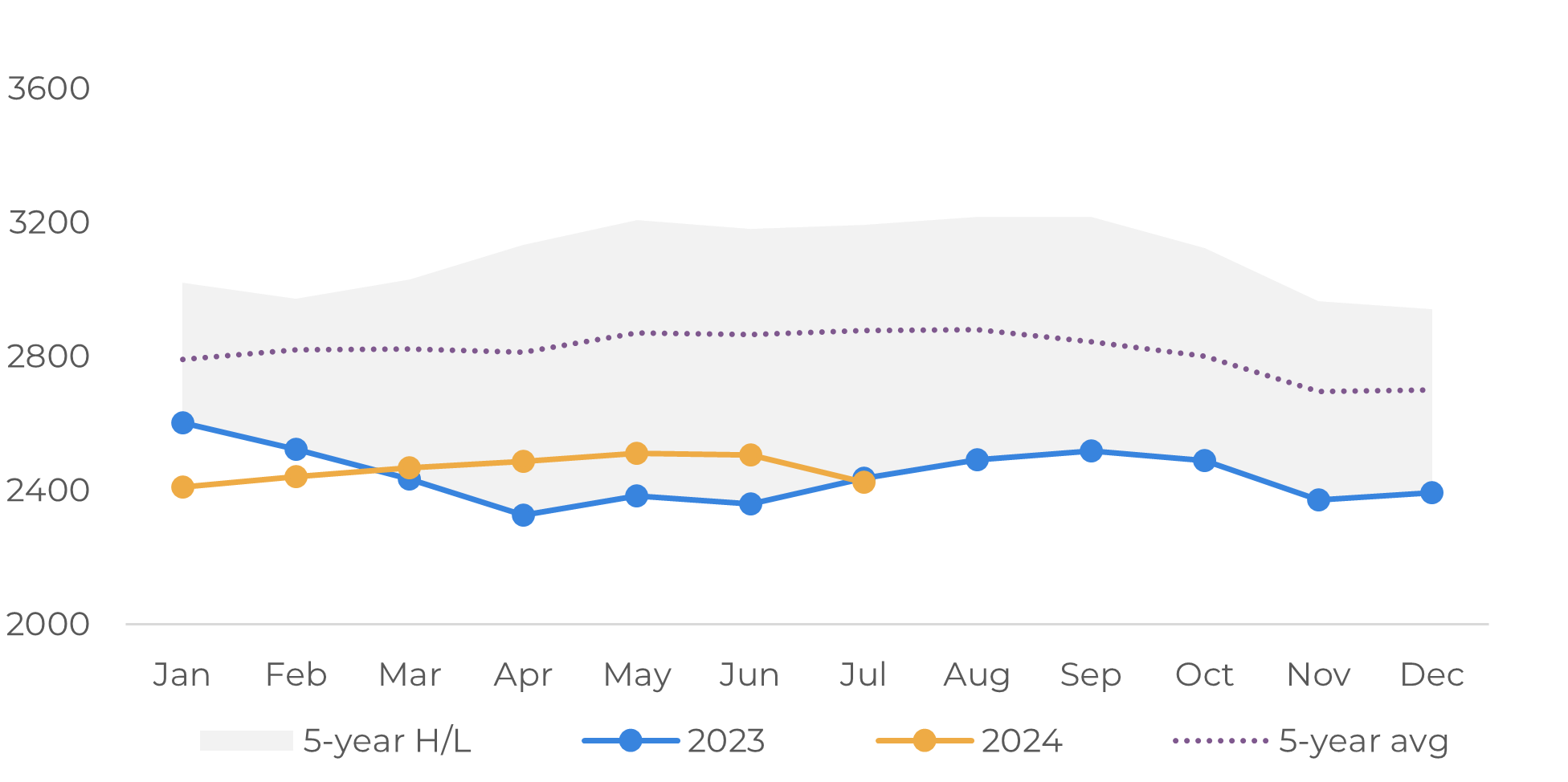
Source: JCA
Japan Apparent Consumption (M bags)
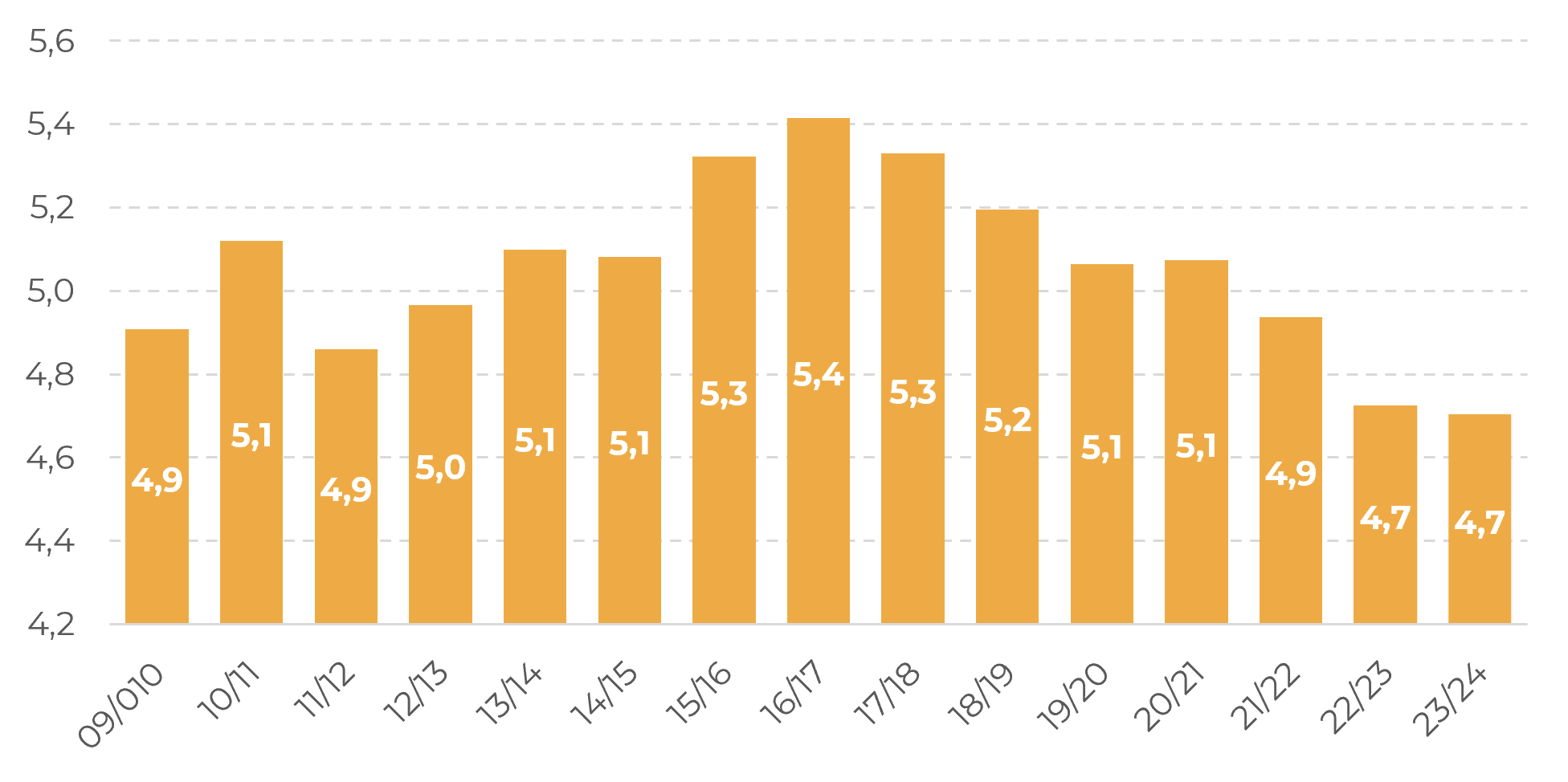
Source: JCA, Hedgepoint
Japan – Imports by Country/Group (‘000 bags)

Source: JCA, Hedgepoint
The decline in Vietnamese supply is also reflected in Japanese imports, with the share of Asian countries falling from 34.2% in 22/23 to 33.1% in 23/24. The share of imports from other countries, such as those in Latin America, with the exception of Brazil, also declined. The latter benefited from the production problems in other origins and increased its share from 33.4% in 22/23 to 37.5% in 23/24, a trend also observed in other destinations, especially in the case of conilon/robusta.
The latest figures for Brazilian exports also confirm this trend. According to Cecafé, a total of 3.73 million bags were shipped in August, up 0.7% from 20/23 and a new record for the month, with conilon standing out. While Arabica shipments fell 6.6% year-on-year to 2.49 million bags, conilon exports totaled 924.6 thousand bags in August, up 31.4% from Aug/23 and a new monthly record for the entire historical Cecafé series. It's worth noting that demand for conilon has even kept the spread between it and arabica negative, as discussed in last week's analysis (link).
Brazil – Arabica Exports (M bags)
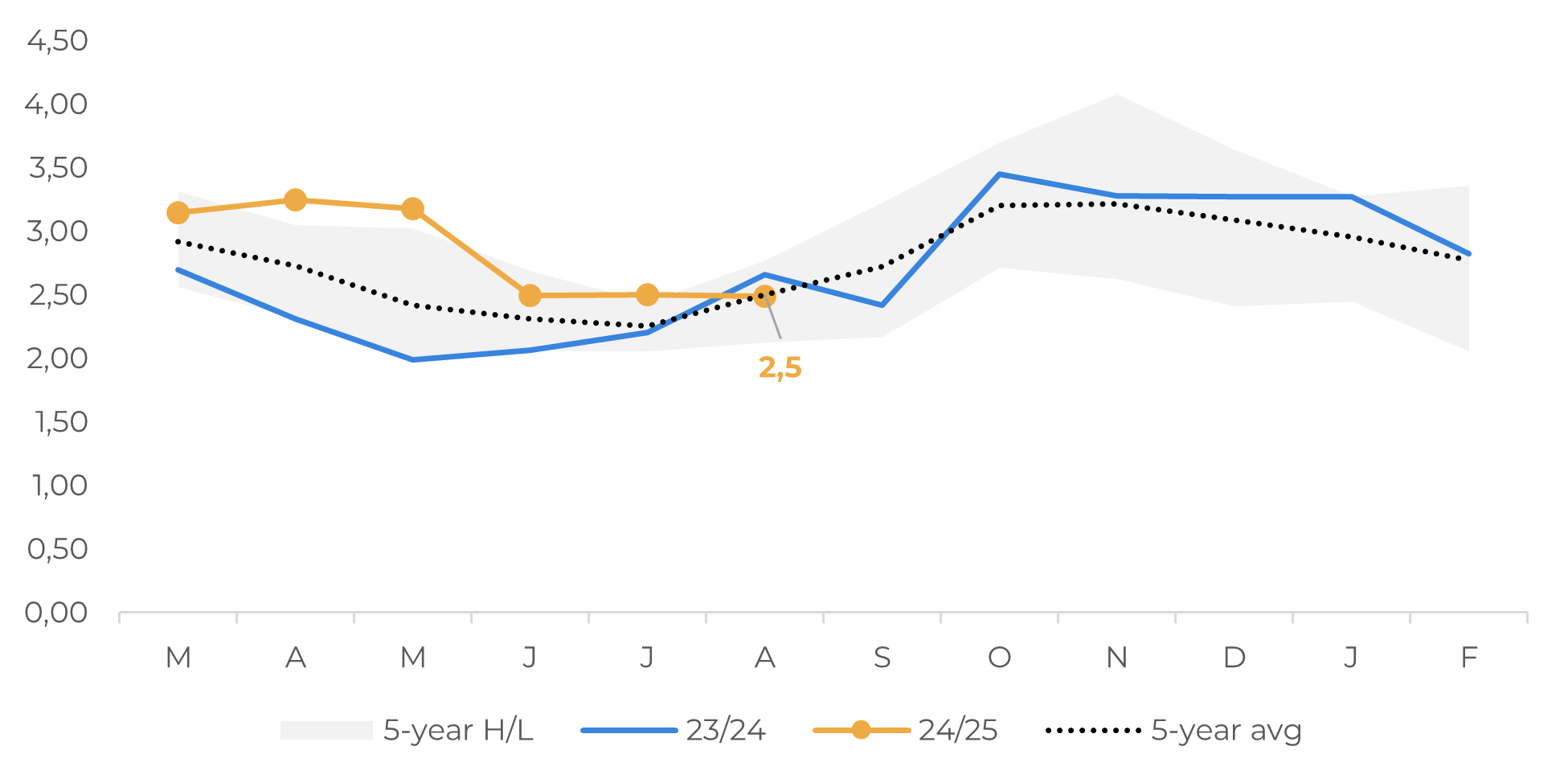
Source: Cecafé
Brazil – Conilon Exports (M bags)
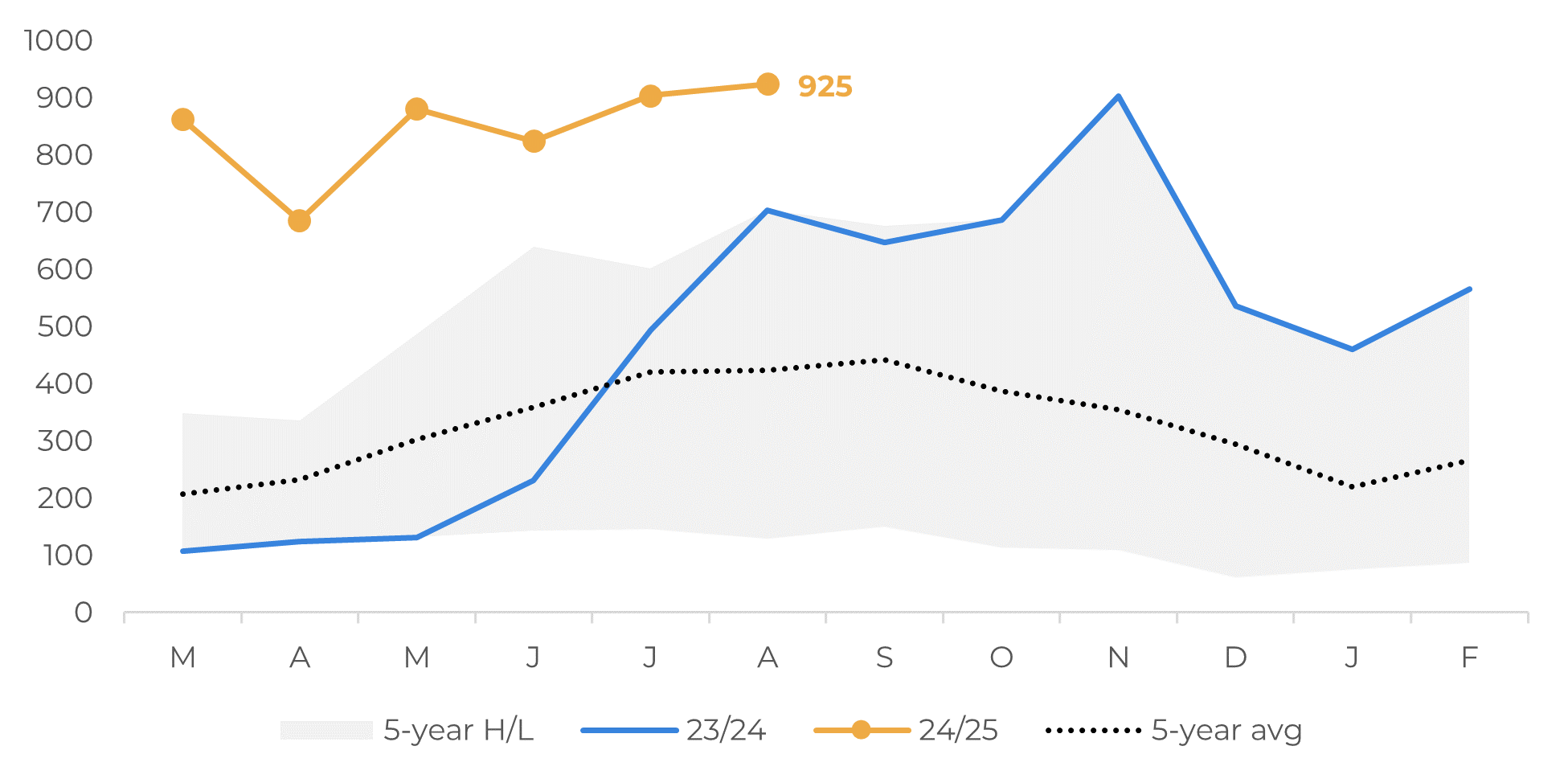
Source: Cecafé
When we analyze Brazilian exports by destination, the growth in conilon shipments is also evident. Although Arabica also increased its share in the main destinations in 2024, Brazilian conilon made significant progress in markets such as Europe, Japan and especially other Asian countries.
Soil Moisture – South of Minas – Brazil (mm)
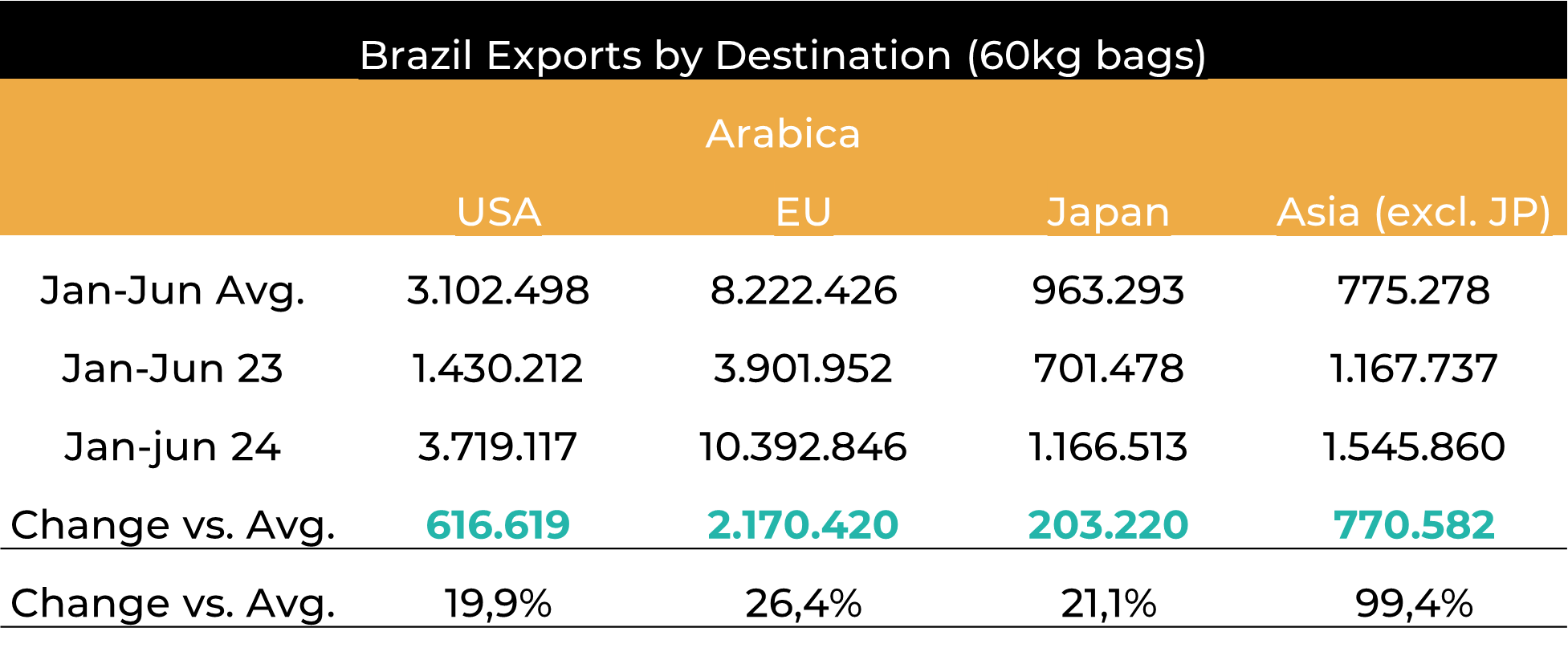
Source: Cecafé, Hedgepoint
Precipitation (mm) and Temperature (°C) Anomaly – Brazil – Sep.
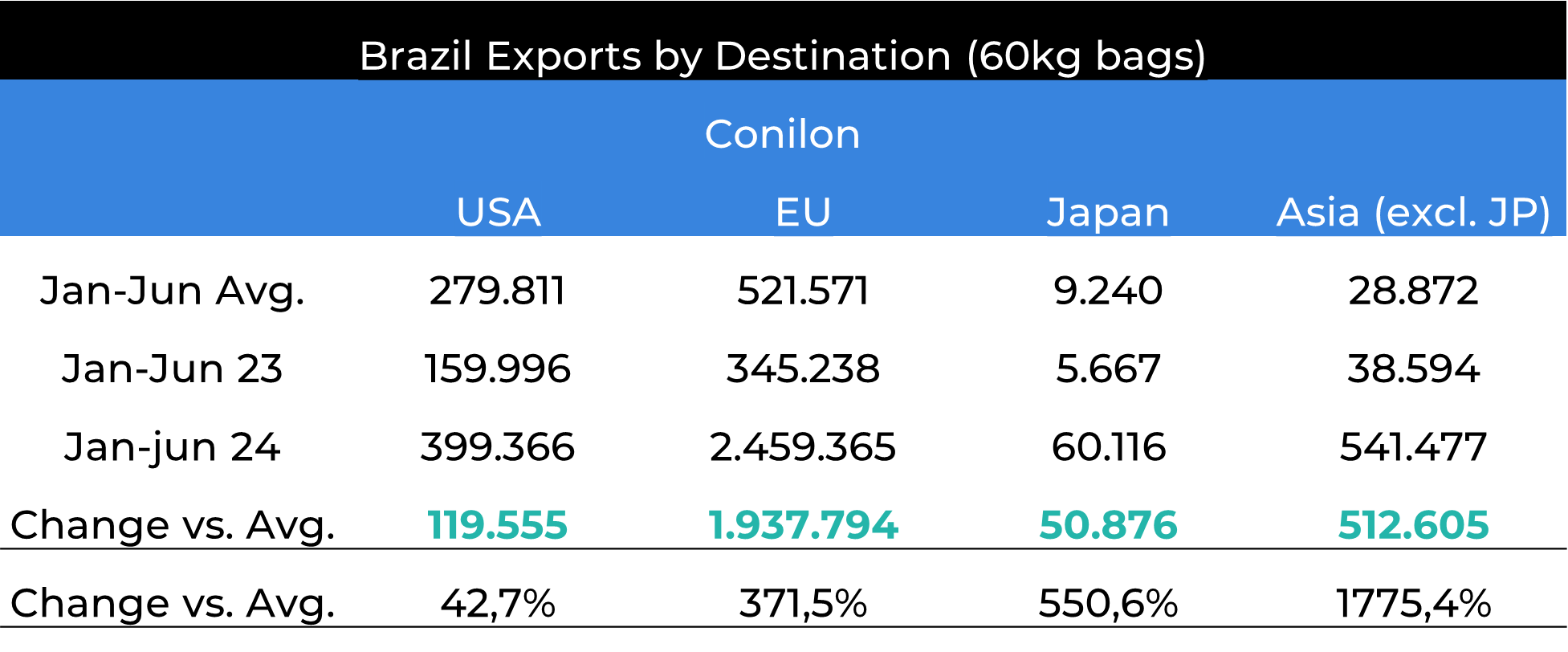
Source: Cecafé, Hedgepoint
In Summary
The latest data from the JCA shows that Japanese coffee stocks have fallen again and are still below historical averages. On the other hand, apparent demand for 23/24, which has been declining in recent seasons, is showing signs of stabilizing, which supports our initial expectations of stable demand in 23/24. It should be noted, however, that in the medium to long term there is still a risk that high prices will have a negative impact on coffee consumption.
The commodity continues to be supported by climatic uncertainties and their potential impact on global production, particularly in Vietnam. It is worth noting that the weather in Brazil has also recently increased market risk - due to the possible impact of the drought on 25/26 - especially as the country has strengthened its role as the world's main coffee supplier while other countries are facing supply problems.
In this sense, Brazilian coffee exports continue to break records, driven mainly by Conilon. Data by destination show that the variety has seen a significant increase in places such as the European Union, Japan and other Asian countries. Thus, with the expectation that global supplies of Robusta will remain tight in 24/25, we expect national shipments to continue at high levels, especially for Conilon.
Weekly Report — Coffee
Written by Laleska Moda
laleska.moda@hedgepointglobal.com
Reviewed by Victor Arduin
victor.arduin@hedgepointglobal.com
victor.arduin@hedgepointglobal.com
www.hedgepointglobal.com
Disclaimer
This document has been prepared by Hedgepoint Global Markets LLC and its affiliates (“HPGM”) solely for informational and instructional purposes, without the purpose of instituting obligations or commitments to third parties, nor is it intended to promote an offer, or solicitation of an offer of sale or purchase relating to any securities, commodities interests or investment products. Hedgepoint Commodities LLC (“HPC”), a wholly owned entity of HPGM, is an Introducing Broker and a registered member of the National Futures Association. The trading of commodities interests such as futures, options, and swaps involves substantial risk of loss and may not be suitable for all investors. Past performance is not necessarily indicative of future results. Customers should rely on their own independent judgement and outside advisors before entering in any transaction that are introduced by the firm. HPGM and its associates expressly disclaim any use of the information contained herein that directly or indirectly result in damages or damages of any kind. In case of questions not resolved by the first instance of customer contact (client.services@hedgepointglobal.com), please contact our internal ombudsman channel (ombudsman@hedgepointglobal.com) or 0800-878- 8408/ouvidoria@hedgepointglobal.com (only for customers in Brazil)
Contact us
hedgepointhub.support@hedgepointglobal.com
ouvidoria@hedgepointglobal.com
Funchal Street, 418, 18º floor - Vila Olímpia São Paulo, SP, Brasil
This page has been prepared by Hedgepoint Schweiz AG and its affiliates (“Hedgepoint”) solely for informational and instructional purposes, without the purpose of instituting obligations or commitments to third parties, nor is it intended to promote an offer, or solicitation of an offer of sale or purchase relating to any securities, commodities interests or investment products. Hedgepoint and its associates expressly disclaim any use of the information contained herein that directly or indirectly result in damages or damages of any kind. Information is obtained from sources which we believe to be reliable, but we do not warrant or guarantee the timeliness or accuracy of this information. The trading of commodities interests such as futures, options, and swaps involves substantial risk of loss and may not be suitable for all investors. You should carefully consider wither such trading is suitable for you in light of your financial condition. Past performance is not necessarily indicative of future results. Customers should rely on their own independent judgement and/or advisors before entering in any transaction.Hedgepoint does not provide legal, tax or accounting advice and you are responsible for seeking any such advice separately.Hedgepoint Schweiz AG is organized, incorporated, and existing under the laws of Switzerland, is filiated to ARIF, the Association Romande des Intermédiaires Financiers, which is a FINMA-authorized Self-Regulatory Organization. Hedgepoint Commodities LLC is organized, incorporated, and existing under the laws of the USA, and is authorized and regulated by the Commodity Futures Trading Commission (CFTC) and a member of the National Futures Association (NFA) to act as an Introducing Broker and Commodity Trading Advisor. HedgePoint Global Markets Limited is Regulated by the Dubai Financial Services Authority. The content is directed at Professional Clients and not Retail Clients. Hedgepoint Global Markets PTE. Ltd is organized, incorporated, and existing under the laws of Singapore, exempted from obtaining a financial services license as per the Second Schedule of the Securities and Futures (Licensing and Conduct of Business) Act, by the Monetary Authority of Singapore (MAS). Hedgepoint Global Markets DTVM Ltda. is authorized and regulated in Brazil by the Central Bank of Brazil (BCB) and the Brazilian Securities Commission (CVM). Hedgepoint Serviços Ltda. is organized, incorporated, and existing under the laws of Brazil. Hedgepoint Global Markets S.A. is organized, incorporated, and existing under the laws of Uruguay. In case of questions not resolved by the first instance of customer contact (client.services@Hedgepointglobal.com), please contact internal ombudsman channel (ombudsman@hedgepointglobal.com – global or ouvidoria@hedgepointglobal.com – Brazil only) or call 0800-8788408 (Brazil only).Integrity, ethics, and transparency are values that guide our culture. To further strengthen our practices, Hedgepoint has a whistleblower channel for employees and third-parties by e-mail ethicline@hedgepointglobal.com or forms Ethic Line – Hedgepoint Global Markets.Security note: All contacts with customers and partners are conducted exclusively through our domain @hedgepointglobal.com. Do not accept any information, bills, statements or requests from different domains and pay special attention to any variations in letters or spelling, as they may indicate a fraudulent situation.“HedgePoint” and the “HedgePoint” logo are marks for the exclusive use of HedgePoint and/or its affiliates. Use or reproduction is prohibited, unless expressly authorized by HedgePoint. Furthermore, the use of any other marks in this document has been authorized for identification purposes only. It does not, therefore, imply any rights of HedgePoint in these marks or imply endorsement, association or seal by the owners of these marks with HedgePoint or its affiliates.

